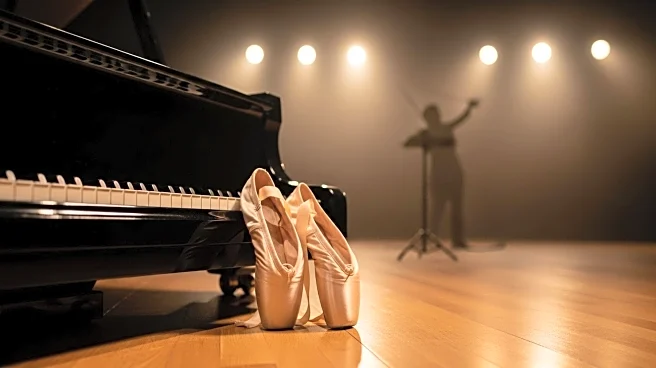What's Happening?
Leonard Bernstein's legacy as a memorializer of President John F. Kennedy is being revisited through various artistic performances. Bernstein, who passed away on October 14, 1990, is remembered for his musical tributes to JFK, including his choice of Mahler's Symphony No. 2, known as the 'Resurrection,' performed shortly after Kennedy's assassination. This symphony was broadcast nationally, serving as a moment of healing for the nation. Bernstein's work continues to influence contemporary performances, such as the Martha Graham Dance Company's 'En Masse,' which is based on Bernstein's 'MASS,' originally composed for the opening of the Kennedy Center. The Los Angeles Opera's production of 'West Side Story' and Gustavo Dudamel's performances with the Los Angeles Philharmonic further highlight Bernstein's impact on the arts.
Why It's Important?
Bernstein's approach to memorializing JFK through music underscores the power of the arts in national healing and reflection. His works, such as 'MASS,' challenged traditional musical genres and offered a platform for political and cultural discourse. These performances not only honor Bernstein's contributions but also reflect on the broader role of the arts in addressing societal issues. As the Kennedy Center seeks to promote more populist art, Bernstein's legacy serves as a reminder of the potential for art to inspire and provoke thought beyond self-interest, making it relevant in today's cultural landscape.
What's Next?
The Martha Graham Dance Company's 'En Masse' will tour nationally and internationally, continuing to explore Bernstein's themes. The Kennedy Center's future programming may include more of Bernstein's works, aligning with its goal to present inspirational American art. These performances may influence how the arts are used to engage with political and cultural narratives, potentially shaping future artistic endeavors at the Kennedy Center and beyond.
Beyond the Headlines
Bernstein's memorialization of JFK through music and dance highlights the intersection of art and politics. His works challenge audiences to reflect on personal and collective identities, offering a path forward for contemporary artists to explore complex themes. The revival of Bernstein's works suggests a growing appreciation for art that transcends traditional boundaries, encouraging new interpretations and innovations in the arts.










